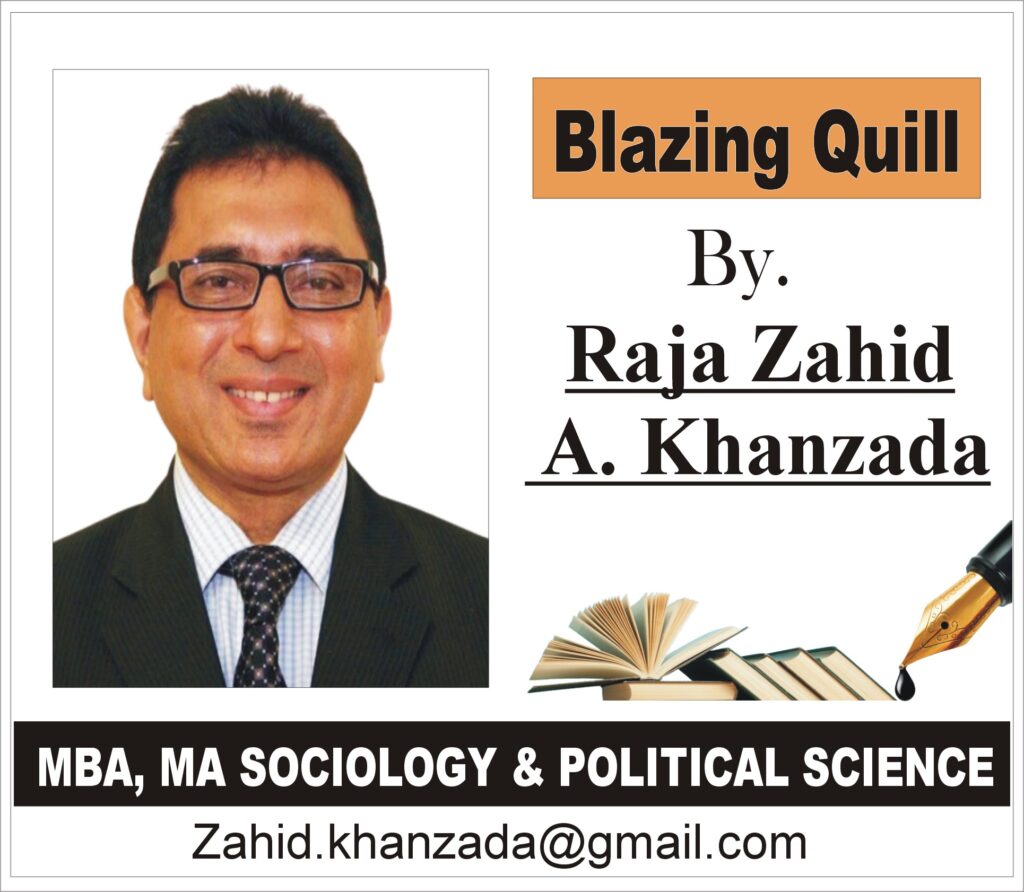Happy Independence Day — But Where is Quaid-e-Azam’s Pakistan?
Echoes of a Question in the Free Skies!
By: Raja Zahid Akhtar Khanzada
It is the evening of Independence Day.
The streets of our cities are adorned with green crescent-and-star flags, buildings glimmer with electric lights, national songs echo from public gatherings, and children run joyfully with little flags in their hands.
Yet, amid all these scenes, one question relentlessly stirs within me:
Is this the same Pakistan that was won on August 14, 1947?
Is this the very dream Muhammad Ali Jinnah envisioned for us with his wisdom and leadership?
Turning the pages of history, one day shines brilliantly before me: August 11, 1947.
The Karachi Assembly Hall. The first session of the Constituent Assembly.
The air is thick with a mix of seriousness and hope.
Quaid-e-Azam Muhammad Ali Jinnah, seated in the President’s chair, begins to speak in his characteristically confident yet gentle tone.
Every eye in the hall is fixed upon him. His words, sharp and precise, carry the weight of an entire nation’s future:
“You are free… You are free to go to your temples, you are free to go to your mosques…
A time will come when Hindus will cease to be Hindus, Muslims will cease to be Muslims,
not in the religious sense, but in the political sense as citizens of the State.”
This was not merely a speech; it was the distilled essence of every principle on which Pakistan was to be built equality, justice, and liberty.
It was the proclamation of Pakistan’s true soul: a state where one’s identity as a citizen would transcend religious affiliation, and where justice, equality, and humanity would be the highest ideals.
But the journey of history did not remain straight.
Soon, the echo of martial law boots resounded through the corridors of power.
Those words, which were meant to be a compass for the nation, were cut out from the curriculum, erased from radio and television broadcasts.
It was decided that the founder’s own words were “dangerous” to the new narrative of power.
Then came the era of Ayub Khan. The wheel of history turned even more ruthlessly.
Fatima Jinnah — the very sister who had stood shoulder to shoulder with her brother, sacrificing for the dream of Pakistan — was branded a “traitor” simply because she stood up against Ayub’s dictatorship.
It was a time when speaking the truth became a crime, and challenging authoritarianism was punishable.
In this climate, the distortion of history continued.
It was during this period that a slogan became popular:
“Pakistan ka matlab kya? La ilaha illallah” “What is the meaning of Pakistan? There is no God but Allah.”
Though today many assume it to be the defining slogan of the Pakistan Movement, in reality it emerged after 1940, and according to some accounts, in 1943–44.
It was coined by poet Asghar Sodai, infused with passion and imagination, and echoed as a fiery cry in public gatherings.
Yet Jinnah himself stated explicitly:
“Neither the Muslim League Working Committee ever passed any resolution regarding this slogan, nor have I ever considered it the official principle of the State.”
For Jinnah, the true foundational motto of the State was “Faith, Unity, Discipline” which he reiterated in his message to the nation on December 28, 1947:
“We are passing through fire, but I am confident that with Faith, Unity, and Discipline we can stand against any nation in the world.”
This was not a mere difference of wording; it was a difference in Pakistan’s philosophical direction.
Jinnah saw religion as a moral guide for individuals, not as the axis of state policy. He envisioned Pakistan as a place of human equality, rule of law, and justice for all.
Seventy-seven years later, the reality is stark.
The dreams of the people have been tangled in the struggle to pay electricity bills, the crushing weight of inflation, and the endless search for justice.
In politics, the same old faces and dynasties dominate, democracy often serves as a mask for the same power games, and the media is still compelled to hide certain truths.
I wonder… if Jinnah were to return today and visit a bookseller asking for a collection of his speeches, would he be told that the book was once banned as “anti-state”?
Would he be told that his sister had been called a traitor?
Would he learn that a slogan born from a poet’s pen had been turned into a political weapon, diverting the State from its original spirit?
As long as our Independence Day celebrations remain limited to flag hoisting, fireworks, and songs, this will not be the Pakistan Jinnah dreamed of.
The true celebration will be the day:
• When the tradition of distorting history ends;
• When neither martial law nor any government dares to erase the truth;
• When religion is no longer used to sow hatred, but humanity’s values are elevated instead;
• When the three pillars of the Constitution — Faith, Unity, Discipline — are alive in every sphere of our national life.
I do not know when that day will come.
But I am certain that when it does, Pakistan will once again stand in the light of Jinnah’s words.
And then we will be able to say with pride: This is our true Pakistan.



